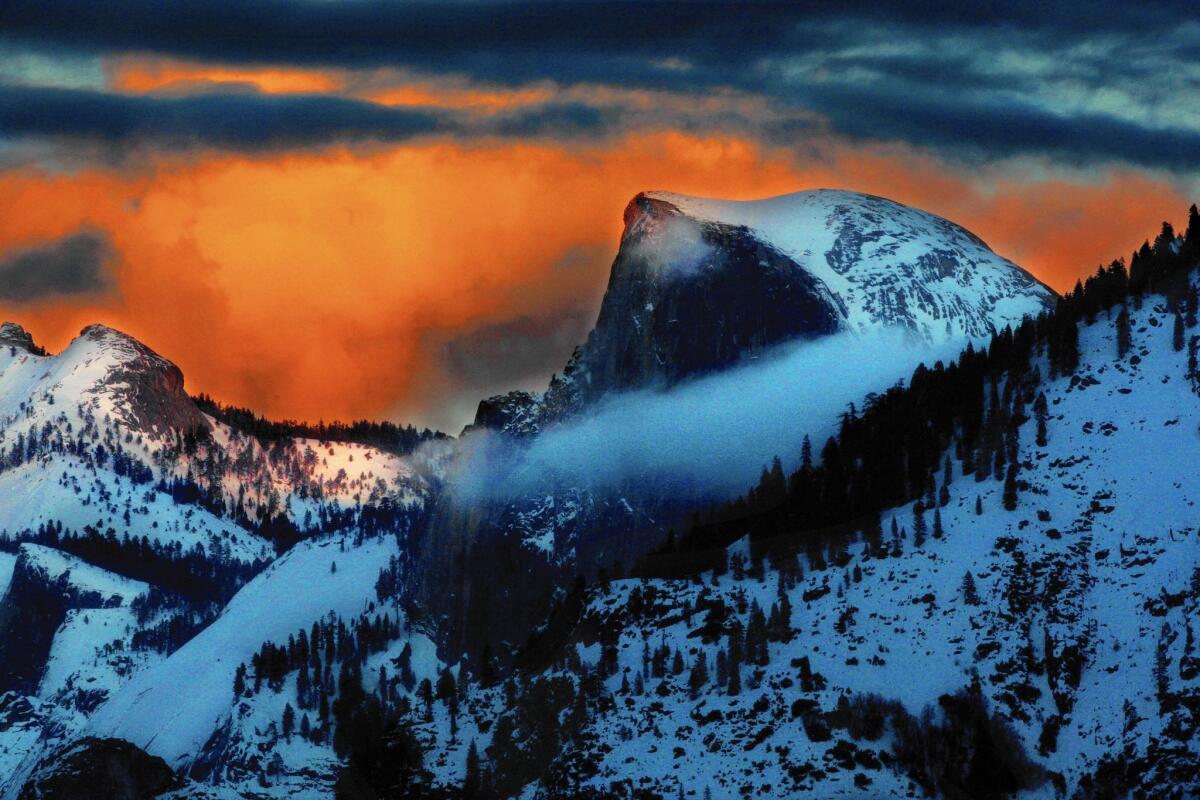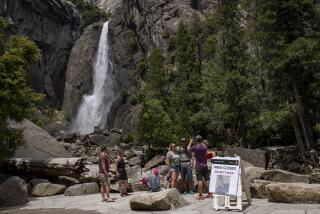No one wins while Yosemite trademark fight drags on

YOSEMITE NATIONAL PARK â Kelly P. McCarthy is a 40-year-old San Francisco native with more than a passing interest in the legal fight between the National Park Service and its former concessionaire, Delaware North, over trademarks to Yosemiteâs most famous amenities.
For decades, McCarthy has attended family reunions at Curry Village, Yosemiteâs beloved tent-cabin campsite. Five days before her most recent family gathering here, in fact, the Park Service announced that because of the legal dispute, it would change some of the parkâs most iconic names: Curry Village is now Half Dome Village.
Did McCarthyâs family embrace the change?
âOh, no way,â she told me Wednesday. âWe will call it whatever we want. Let them send us a cease-and-desist letter. I am uniquely qualified to respond.â
Indeed.
McCarthy is a trademark attorney who specializes in brand protection. She has many opinions about the Great Yosemite Name Spat.
None is particularly favorable to Delaware North, which has sued for breach of contract because the Park Service failed to require Yosemiteâs incoming concessionaire, Aramark, to pay tens of millions of dollars for the names the company trademarked on the sly.
(Including, most absurdly, âYosemite National Park.â That application was denied twice by the U.S. Patent and Trademark Office. On its third try, though, the company prevailed, but only for gift shop tchotchkes and T-shirts. But still.)
I wondered whether McCarthy thought the Park Service acted in good faith when it sent employees out in the middle of the night last week to change all the road signs in the park.
Or was it trying to raise the heat on Delaware North by making the company look bad to park visitors, who were incensed by the name changes? And did Delaware North behave unethically when it trademarked the names without first alerting the Park Service?
NEWSLETTER: Get the dayâs top headlines from Times Editor Davan Maharaj >>
I think Delaware North should bequeath the trademarks to the Park Service, for a minimal amount. Doing otherwise is simply gouging the government for intellectual property that is meaningful only in its natural context.
The family-held company profited handsomely from its 15-year contract, which the Park Service extended an additional seven years. The company paid no property taxes for its unique monopoly, and remitted to the Park Service in fees only about 10% of the billion dollars plus it collected in gross revenue.
I thought perhaps the Park Service was being disingenuous by blaming the name changes on advice from its Justice Department attorneys. That seemed a cop-out. Why didnât Yosemite brass just stand up and say, Buzz off, Delaware North, we own the names, and thatâs that?
âWe firmly believe that these names belong to these properties and to the American people,â Yosemite spokesman Scott Gediman told me in his office last week.
The decision to change the names was made after Delaware North sent letters to Yosemite and Aramark officials offering a free license and free use of the names while the lawsuit was litigated.
âThe feeling of the government,â Gediman said, âwas that if we took them up on that offer, that would be an acknowledgment that they own the names.â
McCarthy said that made sense. Rechristening park icons may tick off park visitors, she said, but from a strategic standpoint, it was a good move.
âThey called Delaware Northâs bluff,â she said. âIt sends a message that âLook, we donât want to do this, and you guys are jerks, but we can survive with the new names. In the end, if you want to hold us hostage for $51 million, you can keep them, because they are basically useless anywhere else.ââ
Further, McCarthy said, Aramark is thus protected from being dragged into the lawsuit as a âcontributory infringerâ on the trademarks.
Dan Jensen, the former president of Delaware Northâs Yosemite operation, sounded positively beleaguered when I reached him the other day in Majorca. Having lived in Yosemite for 23 years and raised his children here, he loves the place as much as anyone.
âWe have never contended the names should be changed,â he said, âand we had no part in doing that. I think itâs horrible. Itâs mean and itâs silly.â
Trademarking names, he said, was simply standard business procedure. Delaware North also wrested Yosemite domain names away from people who had registered them in the 1990s when Internet use was exploding.
âThose are valuable assets that we have to leave behind,â he said, and the company expects to be paid for them. (The Park Service puts the value of the intangible assets like names at about $3 million.)
Jensen scoffed at the idea that the Park Service was in the dark about the trademarks. âWhen they say the trademarks were obtained without their knowledge, I guess that might be true. But did they know the names were trademarked? Yes, they did. In any marketing document that you would pick up, there was a little âTMâ or âRâ next to all the names. All our marketing material had to be approved by the Park Service.â
Nevertheless, the Park Service filed a petition two weeks ago asking that the trademarks be canceled because there is no longer an association between Yosemite and Delaware North.
I can appreciate Jensenâs frustration with the simplistic narrative that has taken hold: Greedy corporation tricks Park Service, then tries to ransom the names of beloved national treasures. It doesnât seem entirely fair.
But nuances aside, this narrative is winning because itâs the one that rings true. Last September, after losing the concession and after filing its breach of contract lawsuit, Delaware North applied to register a Yosemite design mark. The application was rejected in January.
Twitter: @AbcarianLAT
MORE FROM ROBIN ABCARIAN
How the honey bee crisis is affecting Californiaâs almond growers
Gloria Steinem and Madeleine Albright: You are not helping Hillary Clinton
In post-bankruptcy Stockton, a mayor and Erin Brockovich team up to scare people about water
More to Read
Sign up for Essential California
The most important California stories and recommendations in your inbox every morning.
You may occasionally receive promotional content from the Los Angeles Times.











